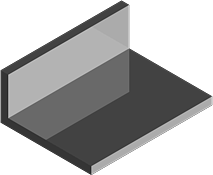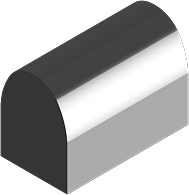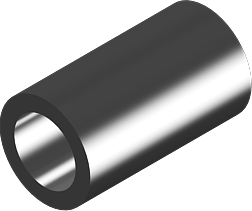Steel Aluminum
View AMS Numbers >Tech Steel & Materials offers aluminum alloys in various shapes and sizes – rod, bar, sheet, plate, tube, pipe, shapes, castings and forgings – for use in engineering structures and components where specifications call for a light, pliable material with strong corrosion resistant properties.
Selected for its low density and ability to resist corrosion, aluminum maintains its shine and corrosion resistance when exposed to a dry environment due to the formation of a clear protective coating of aluminum oxide.
Generally speaking, aluminum alloys can achieve stiffer and lighter designs than are possible with steel.
Properties
Aluminum alloys are alloys in which aluminum (Al) is the principal metal. Aluminum is typically alloyed with copper, magnesium, manganese, silicon (Si) and zinc. Al-Si is considered the most important cast aluminum alloy due to a high amount of silicon, offering optimal casting characteristics. Aluminum-magnesium alloys are both lighter than other aluminum alloys and far less flammable than alloys that contain a very high level of magnesium.
Compared with other alloys, aluminum alloy is a relatively pliable, resilient, flexible and malleable metal with a silver to dull grey appearance, depending on the surface texture.
The two main classifications of aluminum alloys are namely casting alloys and wrought alloys. Both types of alloys can be further classified by their differing reactions to heat: heat-treatable and non-heat-treatable.
About 85% of aluminum is used for wrought products, such as rolled plates, foils and extrusions. Cast aluminum alloys are greatly cost effective due to their low melting point, but they are less malleable than wrought alloys.
Applications
Aluminum alloys are often used in engineering structures and the aerospace and transportation industries due to their high strength-to-weight ratio, since pure aluminum metal is much too soft for such uses, and it cannot meet industrial-strength specifications.
When selecting the right alloy for a given application, strength, density, formability, weight, malleability and corrosion resistance must be considered.
Select AMS Number:
| AMS Number | Alloy | Type | UNS | Cross Ref. Spec | Misc./Shape | |
|---|---|---|---|---|---|---|
| AMS 4013 Laminated | Aluminum | Aluminum | - | MIL-S-22499 | Laminated | |
| AMS 4013 Sheet | Aluminum | Aluminum | - | MIL-S-22499 | Sheet |
 |
| AMS 4013 Shim | Aluminum | Aluminum | - | MIL-S-22499 | Shim | |
| AMS 4342 |
Aluminum | Aluminum | A97050 | - | Extrusion |
 |
| AMS 4914 |
Aluminum | Misc | - | - | Foil |
 |
| AMS 5530 Plate | Aluminum | Misc | N10002 | - | Plate |
 |
| AMS 5530 Sheet | Aluminum | Misc | N10002 | - | Sheet |
 |
| AMS 5530 Strip | Aluminum | Misc | N10002 | - | Strip |
 |
| AMS 5889 Inconel 617 Sheet | Aluminum | Nickel | N06617 | - | Inconel 617 Sheet |
 |
| AMS 5889 Inconel 617 Strip | Aluminum | Nickel | N06617 | - | Inconel 617 Strip |
 |
| AMS 5940 Bar | Aluminum | Misc | R30783 | - | Bar |
 |
| AMS 5940 Forging | Aluminum | Misc | R30783 | - | Forging |
 |
| AMS 5940 Ring | Aluminum | Misc | R30783 | - | Ring |
 |
| AMS 6257 Bar | Aluminum | Steel | - | - | Bar |
 |
| AMS 6257 Forging | Aluminum | Steel | - | - | Forging |
 |
| AMS 6257 Tubing | Aluminum | Steel | - | - | Tubing |
 |
| AMS DTL 22499 1A |
Aluminum | Aluminum | - | MIL-DTL-22499/1B | Shim | |
| AMS DTL 22499 2A |
Aluminum | Brass | - | MIL-DTL-22499/2A | Shim | |
| AMS DTL 22499 3 |
Aluminum | CRES | - | MIL-DTL-22499/3B | Laminated | |
| AMS DTL 22499 4 |
Aluminum | Steel | - | MIL-DTL-22499/4A | Laminated |

 Tech Steel & Materials
Tech Steel & Materials